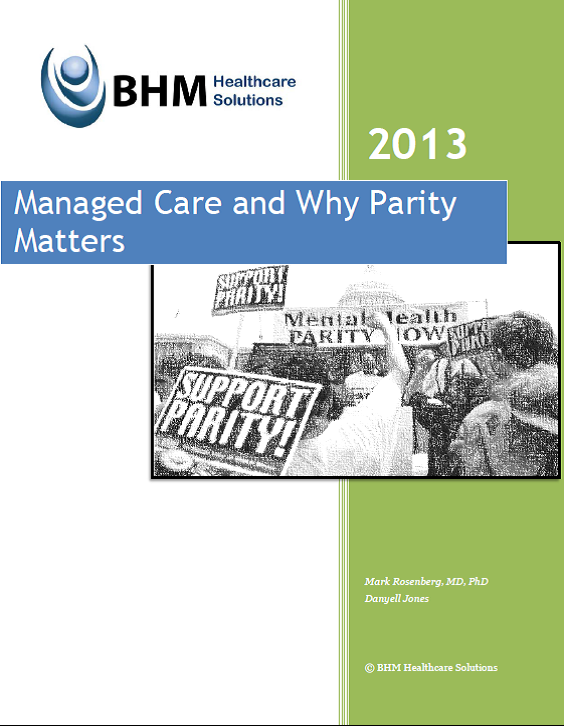Summary: Just announced, new mental health parity provisions to become effective in 2014. How will the new Mental Health Parity Laws affect you?

On November 8, 2013, it was announced that the Affordable Care Act (ACA) will expand coverage under the Mental Health Parity and Addiction Equity Act (MHPAEA) beginning in 2014. So, what does this mean exactly?
The original MHPAEA was passed in 2009 under the Bush Administration in an effort to provide parity in coverage for those with mental illnesses to those with physical illnesses. Previously, plans had limited provisions under their health plans such as number of days of psychiatric hospital care per year and how often the visits could occur.
The legislation tries to level the playing field acknowledging that mental issues are just as important to treat as physical. Under the Obama administration, one of the important issues is gun control. In expanding the MHPAEA, treating mental illnesses could reduce killings and mass murders.
In 2014, the final rule provides additional consumer protections such as:
- Applying parity to intermediate levels of care received in residential treatment or intensive outpatient settings
- Clarifying the scope of transparency required by health plans, including disclosure rights of plan participants, to ensure compliance with the law
- Clarifying that parity applies to all plan standards, including geographic limits, facility type limits and network adequacy
 Starting in 2014, the ACA will create one of the largest expansions of mental health and substance abuse coverage in a generation, requiring that all new small-group and individual market plans offer mental health services and cover them at a par with medical benefits. Previously parity was focused upon the larger group markets, those with 51 or more employees. It is interesting to note that plans are not required to include mental illness coverage in general nor are they required to cover certain mental illnesses. However, if they do cover these, they must abide by the parity provisions. An exception to this rule is the Health Insurance Marketplaces. Plans offered on the public exchanges must cover mental illnesses as part of the Minimum Essential Benefits.
Starting in 2014, the ACA will create one of the largest expansions of mental health and substance abuse coverage in a generation, requiring that all new small-group and individual market plans offer mental health services and cover them at a par with medical benefits. Previously parity was focused upon the larger group markets, those with 51 or more employees. It is interesting to note that plans are not required to include mental illness coverage in general nor are they required to cover certain mental illnesses. However, if they do cover these, they must abide by the parity provisions. An exception to this rule is the Health Insurance Marketplaces. Plans offered on the public exchanges must cover mental illnesses as part of the Minimum Essential Benefits.
Federal officials estimate that the ACA will extend parity protection to nearly 30 million people in individual and small-group plans, and offer insurance with mental health coverage to another 32 million previously uninsured Americans.
What does parity accomplish?
- Parity prohibits health plans from applying more restrictive monetary requirements and treatment limitations on mental health and substance abuse benefits than provided as comparable medical and surgical benefits.
- Parity reinforces illnesses of the brain should not be treated differently than illnesses of the body.
The Mental Health Parity and Addiction Equity Act requires many insurance plans that cover mental health or substance use disorders to offer coverage for those services that is no more restrictive that the coverage for medical/surgical conditions. This requirement applies to:
- Copays
- Coinsurance
- Out-of-pocket maximums
- Limitations on services utilization, (i.e. inpatient days or outpatient visits)
- The use of care management tools
- Coverage for out-of-network providers
- Medical necessity criteria
 ACA extension of parity requirements
ACA extension of parity requirements
- In 2014, ACA will require all small group (less than 50) and individual market plans created prior to March 23, 2010 to comply with federal parity requirements
- Plans offered through the Health Insurance Marketplaces, including both federal and state-run, must include coverage for mental health and substance use disorders as one of the ten categories of Essential Health Benefits
- Extends coverage to employers who have less than 51 employees
- Extends coverage to the individual market plans
- Medicaid Alternative Benefit Plans and benchmark equivalent plans
In a nutshell, the MHPAEA was designed to provide parity between treating mental illness and physical illness. In 2014, coverage will be extended to include small group plans as well as individual plans and all plans offered on the public exchanges. It is a step in the right direction toward integrated care – the treatment of the whole body including the mind.
